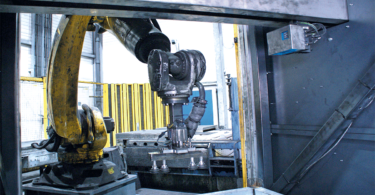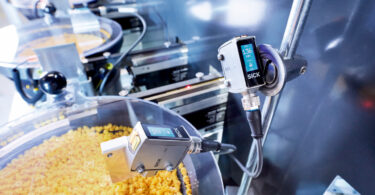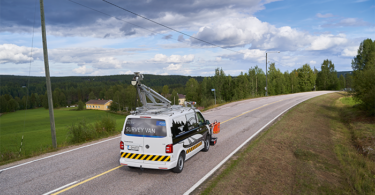Schiller intralogistics automation use SICK safety laser scanner sensors to create an autonomous vehicle fleet solution for intralogistics applications
For intralogistics of the future, Schiller intralogistics automation and SICK are collaborating on a platform solution for a modular indoor/outdoor vehicle fleet. This fleet is made up of autonomous vehicles, picking robots, mobile platforms, lift trucks, and autonomous tugger trains.
Driven by a kind of gold-rush atmosphere, the topic of autonomous driving is not only gaining momentum in the automotive industry but particularly in production logistics and intralogistics. Flexible logistics concepts are replacing static systems and require scalable solutions.
“There is no such thing as a universal AGV, instead we actually need a chain of AGVs to take care of a variety of transport tasks,” said Peter Stoiber, Division Head Mobile Robotics at Schiller and Managing Director at Mojin Robotics.
With an objective to automate the logistics chain of indoor and outdoor applications, Schiller developed new participants that could autonomously complete their transport tasks either individually or as a group.
Interconnected logistics by networked experts
To make safe autonomous driving in the production and intralogistics context possible, Schiller and SICK, as specialists in functional safety, embarked on a close collaboration called “Cooperate to innovate.” Their experts continuously exchanged ideas during the development phase which resulted in a breakthrough concerning certified safety sensors. The latest scanner developments from SICK: the microScan3 safety laser scanner for the indoor tugger trains, and the outdoorScan3 safety laser scanner for an outdoor solution. The safety laser scanners from SICK, with their 128 freely configurable fields and eight simultaneous protective fields, can be flexibly adapted to the requirements of the application. The protective field range of 4 meters allows high speeds even when turning corners and stepwise speed reduction, combining both functional safety and productivity.
“It was the outdoor scanner from SICK that first enabled us to even consider the outdoor capability,” said Peter Stoiber. “There is no sense in developing a vehicle, tackling all the hurdles, and then having it all fail at certification.”
Under the support of SCiO Automation, teams from Schiller Mobile Robotics and Mojin Robotics are continuing to work with SICK developers on concepts for optimizing the outdoor performance in extreme environmental and weather conditions. Mojin Robotics was founded in 2015 as a spin-off of the Fraunhofer Institute for Production Technology and Automation IPA and has been a subsidiary of Schiller since late 2020.
“We jointly consider at the vehicle level, at the accessories level, and of course also at the sensor level what challenges still reveal themselves in outdoor applications. We can only address these through a joint dialog with expert customers and users,” said Michael Badeja, Product Manager for safe outdoor automation, SICK AG.
With indoor tugger trains, you begin to hit the limits when goods need to be stored in different halls. The outdoor tugger trains were developed for this reason.
When you walk around the production halls in the automotive industry, you can observe the autonomously driving indoor electric tuggers from Schiller. They each pull four trailers with manufacturing parts to the next place of use and transport a total weight of up to 3 tons with a total vehicle length of 10 meters. However, the manufacturing and storage buildings are several hundred meters apart. The automotive industry is employing the outdoor variant from Schiller for routes through these outdoor areas.
Digital transformation components integrated into the overall concept
The gap between indoor and outdoor is bridged by the autonomous logistics and picking assistant LUKA (AMC-UR10). The generic term AMC stands for “Autonomous Mobile Cobot.” It was developed by Schiller and Mojin Robotics to eliminate automation gaps in internal supply chains, boost productivity, and free up specialist staff. When a tugger train drives into a warehouse, for example, it can be loaded there with small load carriers by a LUKA. This can be done in addition to or to complement automatic conveyor systems or manual loading/unloading.
Then the tugger train drives in the direction of production. There another LUKA awaits it to take over the small load carriers from the trailers and distribute them along the production line. The Mobile Cobot can also temporarily transfer the carriers indoors onto outdoor automatic guided vehicles. This is a technological solution that Schiller developed as part of an overall package for optimizing a seamless logistics chain.
The company brands within the SCIO Group have each enjoyed a decades-long history of growing success. The establishment of the SCIO platform has united sound knowledge and the advantages of a partnership with other successful brands in the same or related industry fields.
This has enabled the creation of an innovative overall system made up of smart individual components. The linking of the expertise of two technology leaders has turned a vision of the future into reality and brought movement into the “vehicle fleet.”
Upgrade for existing transport systems
It is not necessary to purchase a completely new autonomous tugger train from Schiller; the existing transport system can be used. It is sufficient to start with a commonly available electric tugger, which Schiller can upgrade to an autonomous tugger train. This substantially reduces the investment costs.
The upgrade kit contains sensors from SICK for localization and protection of the vehicle: the NAV-LOC localization system (consisting of a 2D-LiDAR sensor and the Sensor Integration Machine SIM2000) and the microScan3 safety laser scanner as well as a controller. The autonomous tugger train can continue to be operated manually by a driver.
“In this way we allow companies to gradually expand their intralogistics into an overarching autonomous mobile robot solution,” said Stoiber regarding options for the upgrade.
“The near future will be characterized by the ongoing digitalization of all areas of life and work in which Industry 4.0 and IoT have become reality: Fully automatic storage areas integrated seamlessly into manufacturing facilities, mobile platforms on safe high-speed routes,” said Michael Badeja. “Safety will mean even more in future. Protection of humans in an increasingly dynamic environment of mobile robots and machines.”
Companies that automate their intralogistics processes beyond the boundaries of halls and want to make it ready for digital transformation can achieve growth with the help of these scalable solutions (and a safety laser scanner).
Want more information about SICK solutions for intralogistics? Contact a SICK representative today!








